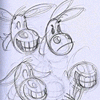
Ink, then digital.
Work for an upcoming Ironclaw project.
====
Birds and mammals don't always understand each other; at a fundamental level, mammals (aside from the curious bats) are stuck living mundane, earthly lives while birds are always free to pick up and leave with little to no notice. This leads to a general avian outlook on life that places little importance on notions of permanence or ties to a location. Birds don't usually recognize nationality or class in the same way mammals do; patriotism or landed aristocracy seems like a silly distinction to make when one acre of mud is little different from another as seen from above.
They aren't very careful about what they say either, spilling out whatever comes to mind regardless of consequence. This is because no matter who is offended, nor how badly an encounter might go, a bird can always lift off to a high branch and safely sort it out or fly away entirely when things get too intense. As a result, they aren't particularly skilled at navigating closure to conflicts and compromise. While this makes them unsuited as diplomats, they are natural couriers, messengers, scouts, spies, bombardiers and so on.
Those with nesting instincts, such as sparrows, are useful in urban construction where space is limited: building out is difficult, but with a mixed team of monkeys and birds, building up becomes much more possible. With something of a monopoly on their particular skills, birds are quite valuable as tradeworkers, forming guilds, unions or organized flocks that can leverage considerable power during boom times of construction.
Birds also find a welcome place in naval settings and exploratory expeditions. Those that sing do so exceedingly well, and a bird in a choir or musical troupe is usually a star performer.
They aren't physically imposing people, typically cheery, vigorous but frail, their beaked faces can be hard to read for subtle expression by those who don't spend much time around birds. This can lead to some interpersonal friction and misunderstanding - and as mentioned, birds don't go out of their way to resolve such things.
Birds tend to specialize and excel accordingly: those that build can work miracles of construction, those that enjoy visual display can make sublime fashions often with their own plumage, those with a musical bent are virtuosos. However bird culture tends to be ephemeral and flashy, not concerned with longevity or conceptual depth; there aren't many avian masterpieces that age well or make sense out of contemporary context.
[NOTE: My understanding is that birds in-game are a general type, there are far too many species and subspecies to be considered individually. This assay is a broad, broad view.]
Work for an upcoming Ironclaw project.
====
Birds and mammals don't always understand each other; at a fundamental level, mammals (aside from the curious bats) are stuck living mundane, earthly lives while birds are always free to pick up and leave with little to no notice. This leads to a general avian outlook on life that places little importance on notions of permanence or ties to a location. Birds don't usually recognize nationality or class in the same way mammals do; patriotism or landed aristocracy seems like a silly distinction to make when one acre of mud is little different from another as seen from above.
They aren't very careful about what they say either, spilling out whatever comes to mind regardless of consequence. This is because no matter who is offended, nor how badly an encounter might go, a bird can always lift off to a high branch and safely sort it out or fly away entirely when things get too intense. As a result, they aren't particularly skilled at navigating closure to conflicts and compromise. While this makes them unsuited as diplomats, they are natural couriers, messengers, scouts, spies, bombardiers and so on.
Those with nesting instincts, such as sparrows, are useful in urban construction where space is limited: building out is difficult, but with a mixed team of monkeys and birds, building up becomes much more possible. With something of a monopoly on their particular skills, birds are quite valuable as tradeworkers, forming guilds, unions or organized flocks that can leverage considerable power during boom times of construction.
Birds also find a welcome place in naval settings and exploratory expeditions. Those that sing do so exceedingly well, and a bird in a choir or musical troupe is usually a star performer.
They aren't physically imposing people, typically cheery, vigorous but frail, their beaked faces can be hard to read for subtle expression by those who don't spend much time around birds. This can lead to some interpersonal friction and misunderstanding - and as mentioned, birds don't go out of their way to resolve such things.
Birds tend to specialize and excel accordingly: those that build can work miracles of construction, those that enjoy visual display can make sublime fashions often with their own plumage, those with a musical bent are virtuosos. However bird culture tends to be ephemeral and flashy, not concerned with longevity or conceptual depth; there aren't many avian masterpieces that age well or make sense out of contemporary context.
[NOTE: My understanding is that birds in-game are a general type, there are far too many species and subspecies to be considered individually. This assay is a broad, broad view.]
Category All / All
Species Unspecified / Any
Size 806 x 1024px
File Size 516.9 kB
"The grass is always greener". Great description. I guess birds would have a "live in the moment" worldview: Except for food and shelter, what else is there to worry about? There's always another hill or river beyond the horizon and they can go anywhere. And the ability to poop on someone's head with impugnity must be A LOT of fun!

 FA+
FA+






















Comments